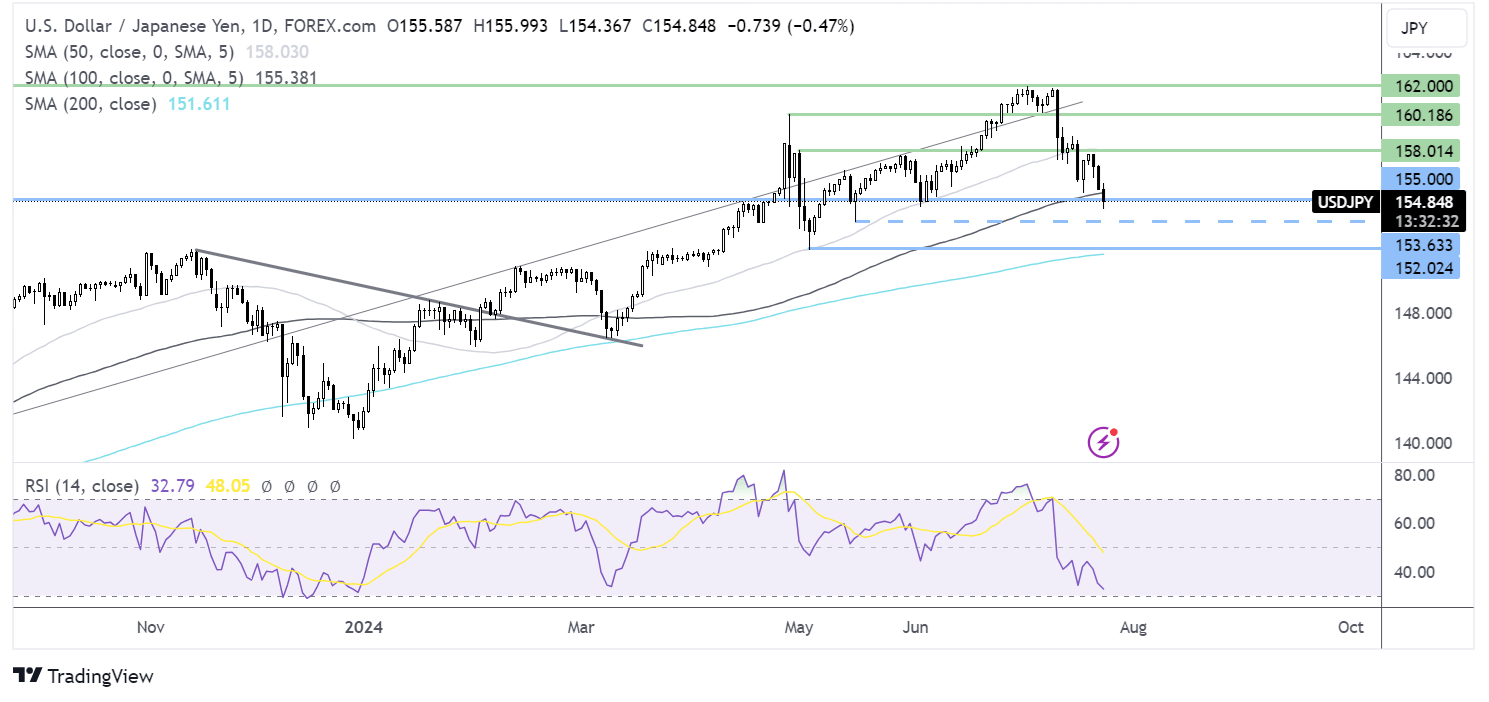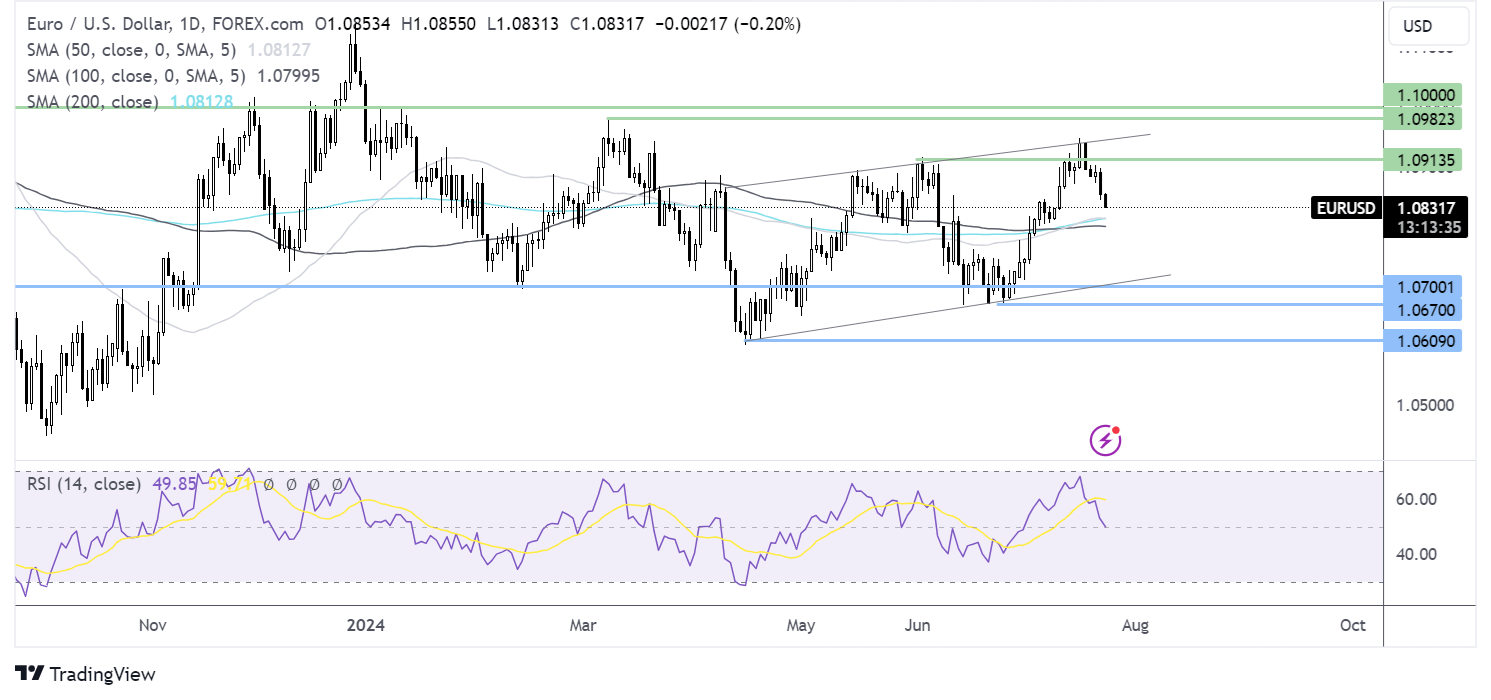
USD/JPY falls to a monthly low
- Yen rises after services PMI rose to 53.9 from 49.4
- US services PMI data is expected to fall to 54.4 from 55.3
- USD/JPY falls to 155.00
The Japanese yen has risen to a monthly high against the US dollar, boosted by a mix of positive economic data, short covering, and safe-haven flows.
JPY is the top performer today, gaining over 0.6% and rising to its highest level since early June. The yen is extending gains from last week, when it jumped sharply amid a suspected government intervention.
The yen's strengthening has been pressurizing short position against the currency, sparking short covering.
Positive PMI data also benefited the yen after an unexpected contraction in manufacturing activity was offset by a rebound in service sector activity.
Attention is now turning to the Bank of Japan meeting next week, and there is growing speculation that the central bank will raise interest rates by ten basis points.
Meanwhile, the US dollar is falling against the yen but rising against its major peers, boosted by some safe-haven flows after the US heavyweight tech earnings underwhelmed amid ongoing political uncertainty in the US.
Vice President Kamala Harris has gained the backing of the Democratic party, and a recent Reuters poll showed Harris slightly ahead of Republican nominee Donald Trump.
Attention is now on US PMI data. The services PMI is expected to ease to 54.4 from 55.3, while the manufacturing PMI is expected to rise to 51.7 from 51.6. Weaker-than-expected data could fuel Federal Reserve rate cut expectations.
While the Fed is not expected to leave rates unchanged at the meeting next week, the market is is pricing in a 90% probability of a rate cut in September. This, combined with the BoJ rate hike expectations, is resulting in some unwinding of the carry trade.
USD/JPY forecast – technical analysis
USD/JPY has extended its selloff from 161.95, breaking below the multi-month rising trendline, the 50 and 100 SMA. This combined with the RSU below 50 keeps sellers hopeful of further losses.
The price is testing support at 155. A meaningful move below here brings 153.60, the mid-May low, into focus ahead of 151.85, the May low.
Any recovery would need to retake 158.00, the May high, to bring 160.00 back into play.

EUR/USD falls after PMIs miss estimates
- Eurozone composite PMI falls to 50.1
- ECB leaves the door open to a September cut
- EUR/USD falls towards 200 SMA
EUR/USD is falling amid USD strength and after weaker-than-expected PMI data from the eurozone.
The composite PMI, considered a good gauge for business activity, stalled in July at 50.1, down from 50.9 in June and well below expectations of an increase to 51.1.
Delving deeper into the figures, both the manufacturing and the service sector were weaker than expected. The manufacturing sector is contracting at a faster pace of 45.6, and services growth is slowed to 51.9, down from 52.8. The data suggests the economy is kicking off H2 on a weaker tone.
The euro has been pressured in recent sessions as ECB policymakers point to inflation cooling in line with expectations, keeping the door open for a September rate cut.
The ECB reduced rates by 25 basis points in June and could do so again in September.
Meanwhile, the market is convinced that the Federal Reserve will lower borrowing rates in September and has priced in the possibility of two more cuts this year, limiting the upside in the US dollar.
However, the greenback benefits from safe-haven flows after underwhelming tech earnings from heavyweights Tesla and Alphabet and amid ongoing political uncertainty in the US.
Kamala Harris has gained the support of the Democrat party and is likely to clinch the nomination. The race between Harris and Trump is likely to be tight.
Meanwhile, USD will focus on PMI figures later today ahead of GDP and core PCE on Friday, the Fed's preferred gauge for inflation tomorrow.
EUR/USD forecast – technical analysis
EUR/USD is extending its selloff from 1.0950, the July high, falling below support at 1.0915 and heading toward the 200 SMA at 1.0810.
Sellers will look to extend losses to the 200 SMA. A break below here negates the near-term uptrend and brings 1.07 into play, the round number, and the lower band of the rising channel.
Any recovery would need to rise above 1.0915 to bring 1.0950 back into focus.







